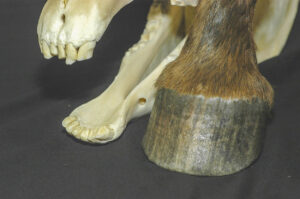Could SAA, Fibrinogen Predict Colic Surgery Complications?

At the 2017 International Equine Colic Research Symposium, held July 18-20 in Lexington, Kentucky, Michael De Cozar, BSc(Hons), BVetMed, MRCVS, shared the results of a study in which he and colleagues evaluated whether two easily measurable biomarkers in horses’ blood—serum amyloid A (SAA) and plasma fibrinogen concentrations—could help predict colic surgery complications. De Cozar is a surgery resident at Bell Equine Veterinary Clinic, in Kent, England.
Serum amyloid A is a protein produced in response to an inflammatory insult. Importantly for veterinarians, its concentrations increases and decreases rapidly, allowing them real-time information on inflammation via a blood test. Fibrinogen is also an inflammatory marker, but doesn’t change quite as quickly as SAA.
In their prospective study, the researchers measured SAA and fibrinogen concentrations in horses undergoing exploratory laparotomy or celiotomy (abdominal surgery) at admission and again every 24 hours for five days following surgery
Create a free account with TheHorse.com to view this content.
TheHorse.com is home to thousands of free articles about horse health care. In order to access some of our exclusive free content, you must be signed into TheHorse.com.
Start your free account today!
Already have an account?
and continue reading.

Related Articles
Stay on top of the most recent Horse Health news with

















